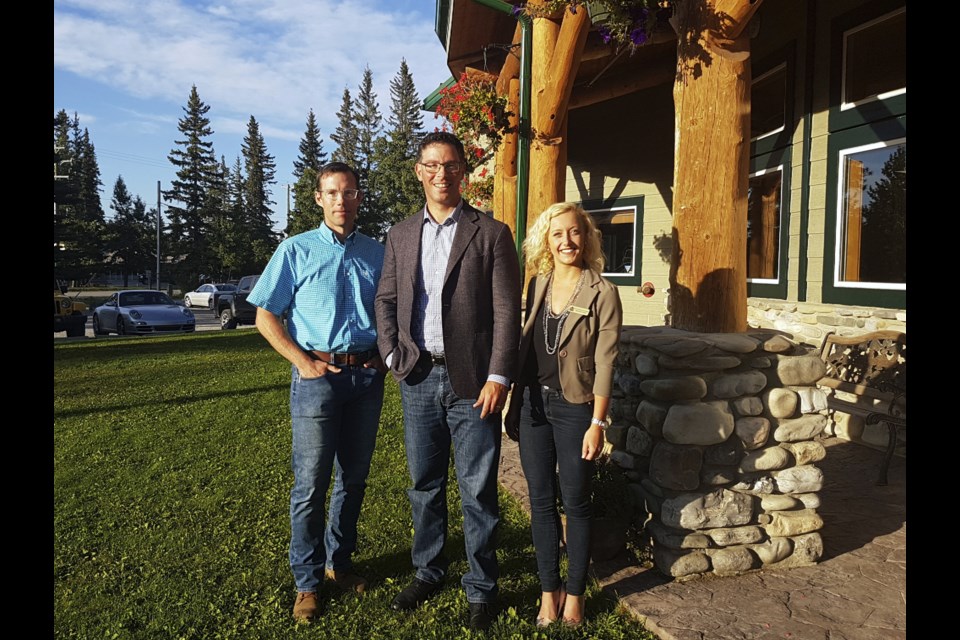The Alberta Rural Crime Tour hit the road on Sept. 5, making its first stop in Bragg Creek.
Doug Schweitzer, Alberta Minister of Justice and Solicitor General, will be taking the tour across Alberta, visiting 18 communities in four weeks to address concerns, and make plans for the future regarding rural crime.
The tour aims to meet with residents, business owners, rural crime watch groups and local officials to hear first-hand the concerns of rural communities.
Foothills County councillors Suzanne Oel and Jason Parker said they were encouraged by the discussions that took place during the Bragg Creek town hall.
“Obviously, as residents are well aware, we’ve had a real issue with rural crime over the last number of years which we’ve been really working on and addressing,” said Parker. “So it was not only voicing the concerns that the residents brought to us about the problems, but also making the Minister aware of some of the initiatives that we’ve implemented that have been working well.”
Rural crime rates have continued to rise since last summer, according to Statistics Canada, where Alberta saw a 38 per cent higher rural crime rate over urban crime rates.
Parker stressed the positive actions the communities have taken, such as enhanced policing, but also the concern that people aren’t reporting incidents when they happen.
“When the Province is making decisions, they’re not actually having the stats that they really need and are required to make educated decisions because of the lack of reporting,” he said, emphasizing the need for improvements to call centres in rural communities.
Oel highlighted the importance of the provincial government talking directly with rural communities in addition to the justice office’s plans and recommendations.
“They’ve had a chance to now find out if the conversations they’ve been having are actually what’s happening at the grassroots level, so they’re ground-truthing their conversations with what’s happening,” she said.
Calling the stop in Bragg Creek a great conversation to start the dialogue, Oel said there is more work to be done.
“From a municipal perspective it’s certainly important to find out where we’re at and what we need to go forward,” she said. “They’re asking us what they can do to support us, which we were quite thrilled to hear.”
Foothills MP John Barlow similarly expressed support for the tour, and the partnership with the provincial government.
“We’re certainly hearing from our town halls and as a minister, I and our MLAs have heard this loud and clear that this is a significant issue,” said Barlow. “To have a partner at the provincial level that we can work with moving forward to try and address these issues (is important).”
Barlow said that a lot has changed since he was growing up in High River.
“People in our communities no longer feel safe in their homes,” he said. “That has just never been the case before… that’s really disappointing and for us, we want to find a way for them to feel confident.”
Schweitzer said the tour was a “listening opportunity” for the provincial government.
He said it would focus on reiterating the UCP’s campaign promises regarding crime, such as the hiring of 50 new prosecutors, providing additional funding for alert, and expanding the reach of drug treatment courts.
“As well, we want to make sure that even though Alberta is in a tough financial situation, we’re going to continue to fund police and prosecutors to make sure that they have the tools and resources that they need to do their jobs," he said.
Schweitzer said the tour is a chance to assure rural communities about more immediate actions the government is taking—such as the hiring of 50 new prosecutors—and plans that will happen further down the road, while listening first-hand to issues communities are facing.
“A lot of these things can change quickly,” he said. “We’ve got meth issues, we’ve got addiction issues across the province, property crime issues, and you get different hot spots at different times.
“We want to make sure we’re listening to people and trying to make sure as well that we have funding models in place so that we can be responsive.”
Schweitzer also expressed concern regarding lower rates of reports, and said that while the statistics on rural crime in Alberta have increased since 2014, the provincial government is worried that some people have stopped reporting incidents.
He linked the decrease in reporting to a loss of confidence in the justice system due to poor response times, dropped 911 calls, or the lack of prosecution for repeat offenders.
“A big part of our initiative is getting out and talking local community leaders, talking to town halls, making sure people have confidence in the policing, and the prosecutions and the justice system as a whole,” he said. “If we do that, we think people will keep making the phone calls, keep making the efforts to do the right thing.”
Schweitzer commended the work that has been done in many rural communities to tackle rural crime, such as watch groups.
“That has been really a big step in the right direction, so one of the takeaways for me is to take a look at that and see what else we (the provincial government) can do to empower them on those local initiatives and crime watches,” he said.
The tour will be wrapping up in Okotoks on Oct. 1, after stops in communities such as Red Deer, Athabasca, Slave Lake, Grande Prairie, Cheadle, Lethbridge, Airdrie, Drayton Valley, and others.
Update: The Okotoks town hall date was changed from Sept. 30 to Oct. 1 by the Rural Crime Tour.



